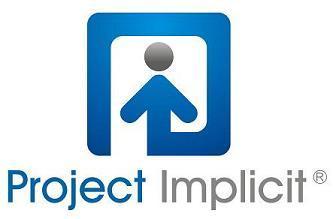First I tried the Race ('Black - White') test. This flashed a series of cartoon images of people with captions. These seemed to use made up names, to prevent a bias there. I was required to respond quickly, but it was not clear how to: an image would flash up briefly, but a mouse click, or key-press did nothing.
One test I was able to get to work was "Gender - Science". This first flashed up a series of gender words, and I was required to indicate if these were male or female. Then a series of discipline words were displayed, and I had to indicate if these were liberal arts or science. These appear to be training, not part of the study, but to ensure I knew how to click the correct button. However, then the disciplines were displayed again, but requiring me to choose from two combinations of gender and type of discipline (such as "Chemistry", "Male or Liberal Arts", "Female or Science" ). Initially I did not know how to respond to this, as the combinations did not make any sense.
After a few minutes thought, I worked out the idea was to try to trick me to respond with a gender bias, for example, respond to "Engineering" with "Male", rather than "science". While knowing this consciously, I still found it difficult to press the right button quickly, and not select "female" for "Humanities" and "Male" for "Science".
The results of the test surprised me, showing a "moderate automatic association for Male with Science and Female with Liberal Arts" (which is the most common response). I would have expected more than "moderate". The results did not give any more details, such as a numeric indication of how biased I was.
The test was frustrating, as it diagnosed a bias, which I was aware of anyway, but did not give me any strategy to correct it. This is similar to when in primary school it was quickly established that I had difficulty with spelling and I spent many lunchtimes in detention for years afterward as a result. That did not help me spell, and I still can't (I am only literate with a spell checker). I suspect it will be much the same with the gender bias: something which I know about, but am unable to change. The ways to address this would instead have to be external, such as blind assessment, where I don't know the gender of the person who's work I am grading (easy to set up with a Learning Management System).

No comments:
Post a Comment